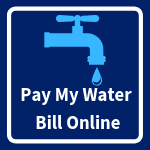- Home
- Departments
- Water & Sewer
- Potential Causes of High Water Bills
Potential Causes of High Water Bills
An unusually high water bill is most often caused by a leak or change in water use. Some common causes of high water bills include:
Do-It-Yourself Toilet Assessment
First check for the most common leak: a deteriorated of defected flush valve (flapper) ball at the bottom of the toilet tank. If it does not make a tight seal, water will leak into the toilet bowl. To check for this:
If you receive a bill that you feel is too high, check over the common causes listed above. This may help to pinpoint the source of the high bill. The Town's Utility Billing Program has the capability to detect a possible leak. It will pick up if your meter has run continuously without an "hour of non-usage" which would raise question of a potential leak. You will receive a letter from the Town is this is indicated. Contact Town Hall if you are not successful in finding the cause and we will help you in determining the source of the leak. If the meter reading is rechecked and found to be accurate, you may need to contact a plumber or other professional for help. Property owners are responsible for all private service water lines from the public water main to the residence and for leaks inside the home.
- A leaking toilet, or a toilet that continues to run after being flushed, most common
- A dripping faucet; a faucet drip can waster 20 gallons or more of water a day
- Filling or topping off a swimming pool
- Watering the lawn, new grass, or trees; also check for an open hose bib
- Irrigation systems, check automated systems, you may need to reprogram
- Kids home for summer vacations or school holidays; guests
- Water-cooled air conditioners
- A broken water pipe or obvious leak; check the pipes and water heater in the basement or crawlspace
- Water softener problems - cycles continuously
- Running the water to avoid freezing water pipes during cold weather
- Service line leaks between your water meter and your home, check for wet spots in your yard
Generally, water consumption is higher during the summer due to watering of lawns, pools, and gardening. Typically, an average family of four uses 4000-5000 gallons of water a month.
Do-It-Yourself Toilet Assessment
First check for the most common leak: a deteriorated of defected flush valve (flapper) ball at the bottom of the toilet tank. If it does not make a tight seal, water will leak into the toilet bowl. To check for this:
- Take the lid off the tank behind the bowl, flush the toilet, then wait for it to fully refill.
- Put a few drops of food coloring or a colored dye tablet (available at Town Hall) in the tank.
- Wait at least 20 minutes; longer if suspect it is a small leak.
- If there is any color in the toilet bowl, there is a leak.
The second most common type of leak has to do with an improperly adjusted or broken fill (ballcock) valve. To check for this, take the lid off of the toilet tank, flush, and see if water is draining into the overflow tubes when the tank is full.
The following table shows the amount of water that can be lost and billed to your account for various size leaks:
| Leak Size |
Gallons Per Day |
Gallons Per Month |
|---|---|---|
| Dripping leak |
15 gallons |
450 gallons |
| 1/32 in. leak |
264 gallons |
7,920 gallons |
| 1/16 in. leak |
943 gallons |
28,300 gallons |
| 1/8 in. leak |
3,806 gallons |
114,200 gallons |
| 1/4 in. leak |
15,226 gallons |
456,800 gallons |
| 1/2 in. leak |
60,900 gallons |
1,827,000 gallons |
What Can I Do if My Bill is Unusually High?
If you receive a bill that you feel is too high, check over the common causes listed above. This may help to pinpoint the source of the high bill. The Town's Utility Billing Program has the capability to detect a possible leak. It will pick up if your meter has run continuously without an "hour of non-usage" which would raise question of a potential leak. You will receive a letter from the Town is this is indicated. Contact Town Hall if you are not successful in finding the cause and we will help you in determining the source of the leak. If the meter reading is rechecked and found to be accurate, you may need to contact a plumber or other professional for help. Property owners are responsible for all private service water lines from the public water main to the residence and for leaks inside the home.









